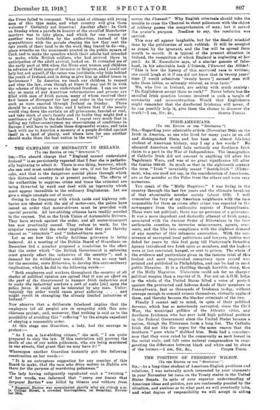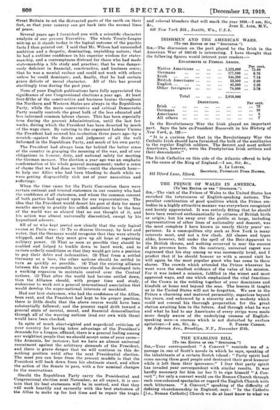THE POSITION OF PRESIDENT WILSON. [TO THE EDITOR or THE " SPECTATOR."'
SIR,—As a long-time student of American-English problems and relations, I was naturally much interested by your comments in your November let issue on the Treaty status in the United States Senate. In spite of your superior understanding of American ideas and politics, you are confessedly puzzled by the situation, and anxious as to what part we will eventually take, and what degree of responsibility we will accept in aiding
Great Britain to set the distracted parts of the earth on their feet, so that your country can get back into the normal lines of peace.
Several years ago I furnished you with a scientific character analysis of our present Executive. The whole Treaty-League mix-up as it stands to-day is the logical outcome of the psychic facts I then pointed out. I said that Mr. Wilson had unbounded ambition and a despotic, dominating, unyielding nature; that he had a sublime confidence in his superior wisdom for statesmanship, and a contemptuous distrust for those who had made statesmanship a life study and practice; that he was dangerously deficient in financial, constructive, and business sense;. that he was a mental recluse and could not work with others unless he could dominate; and, finally, that he had certain grave defects of moral character. All of this has proved startlingly true during the past year.
None of your English publications have fully appreciated the significance of our Congressional elections a year ago. At least four-fifths of the constructive and business brains throughout the Northern and Western States are always in the Republican Party, while the more• conservative and critical Democratic Party usually controls the great bulk of the less educated and less informed common labour classes. This has been especially true during the present Administration, until the last few weeks, during which the President has been deserted by much of the wage class. By catering to the organized Labour Unions the President had secured his re-election three years ago—by a scratch—against the desire and judgment of all the well informed in the Republican Party, and much of his own party.
The President had always been far behind the better sense of the country in grasping the meaning of the war, and of our obligations in honour, duty, and national safety for meeting the German menace. The election a year ago was an emphatic condemnation of his whole general management; under a sense of shame that we had done so little—until the eleventh hour— to help our Allies who had been bleeding to death while we were getting disgracefully rich out of your necessities and sufferings.
When the time came for the Paris Convention there were certain eminent and trusted statesmen in our country who had the confidence of all statesmen, and whom the common consent of both parties had agreed upon for our representatives. The idea that the President would desert his post of duty for many months merely to gratify his selfish ambitions to be the boss of the world was so absurd that no one thought of it, and his action was almost universally discredited, except by his hypnotized adorers.
All of us who kept posted saw clearly that the only logical coarse at Paris was: (1) To so disarm Germany, by land and water, that the Germans would recognize that they were utterly whipped, and that they must give up all hope of regaining military power. (2) That as soon as possible they should be enabled and helped to buckle down to hard work, and to restore orderly conditions so that they would get into a position to pay their debts and indemnities. (3) That from a settled Germany as a base, the other nations should be settled in turn as quickly as possible. (4) That the existing alliance between the few responsible nations should be developed into a working organism to maintain control over the Central nations. (5) That after the world had become settled down, then the Alliance should, with proper time and study, endeavour to work out a general international association that would develop the super-national interests of mankind.
Had our best statesmen, who had the confidence of the Allies, been sent, and the President had kept to his proper position, there is little doubt that the above course would have been substantially followed; and the present rapid drift toward a general state of mental, moral, and financial demoralization through all of the warring nations (and our own with them) would have been checked.
In spite of much short-sighted and superficial criticism of your country for having taken advantage of the President's demands for a League, offhand, there is a general feeling among our weightiest people that we should accept some of your cares— like Armenia, for instance; but we have an almost universal resentment against the arbitrary demands of the President, and there is grave danger that we will continue in this donothing position until after the next Presidential election. The most you can hope from the present muddle is that the President will back down from his obstinate stand, and allow the action of the Senate to pass, with a few nominal changes in the reservations.
Should the Republican Party carry the Presidential and Congressional election next November, as all expect, it is certain that its best statesmen will be in control, and that they will work heartily and earnestly with the 'best statesmen, of the Allies to make up for lost time and to repair the tragic and colossal blunders that will mark the year 1919.—I am, Sir,
&c., Joan E. Aims, M.V. 638 New York Blk., Seattle, Wn.,



















































 Previous page
Previous page